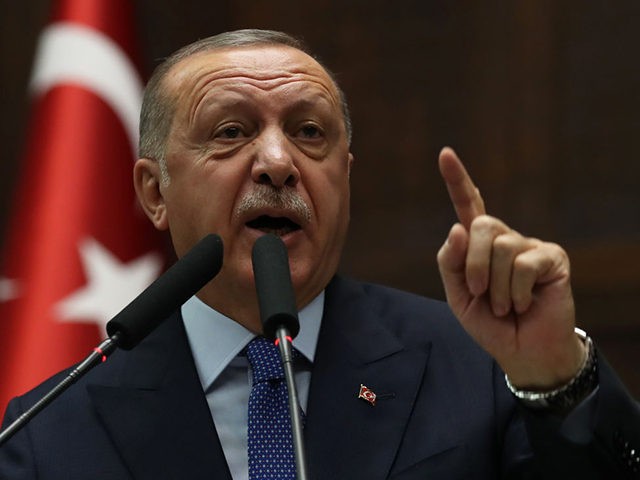Turkey’s Erdogan Gears Up for Another Incursion into Syria and Iraq
 ADEM ALTAN/AFP via Getty Images
ADEM ALTAN/AFP via Getty Images
Turkish President Recep Tayyip Erdogan appears to be preparing for another military incursion into the border regions of Syria and Iraq to fight the PKK, a violent Marxist Kurdish separatist group seen by Erdogan’s government as the primary threat to Turkey’s security.
Erdogan said after a cabinet meeting last week that he was preparing a decisive operation against PKK positions in Syria and Iraq.
“Hopefully, this summer, we will have permanently resolved the issue regarding our Iraqi borders. Our will to create a security corridor 30-40 kilometers deep along our Syrian borders remains intact,” Erdogan said.
“We have preparations that will give new nightmares to those who think that they will bring Turkey to its knees with a ‘terroristan' along its southern borders,” he added.
According to independent Turkish media outlet Duvar, Turkish forces have already crossed the Iraqi border and moved about 30 kilometers inland. Airstrikes against PKK positions in Iraq and Syria have been ongoing since January 12, when nine Turkish soldiers were killed during a PKK raid on a military outpost in the Kurdistan Autonomous Region of Iraq.
This attack, coupled with the killing of 12 Turkish soldiers in northern Iraq three weeks previously, prompted Turkish officials to declare they would “fight to the end” to eradicate the PKK.
Erdogan laid the groundwork for his latest cross-border assault on the PKK by sending envoys to meet with officials from Iraq and the Kurdistan Regional Government (KRG), as well as the United States and Russia. Erdogan personally met with KRG President Nichirvan Barzani on March 1.
Duvar quoted various sources who said Erdogan is waiting for either the end of the Muslim Ramadan holiday season or local elections on March 31 in Iraq, before pulling the trigger on a major military operation against the PKK. Erdogan has predicted the operation would be complete by the end of the summer.
Kurdish media expected Erdogan to make his move sometime in mid-April after discussing some oil and water supply issues with the Iraqi government. Iraq has long complained that Turkey’s energetic construction of dams along the Tigris and Euphrates rivers is making droughts worse. The Iraqis could demand some concessions from Turkey before green-lighting an invasion against the Kurds.
Bloomberg News on Monday reported Turkey has also been trying to convince Iraq that destroying the PKK would be in its best interests since the PKK’s ultimate goal is to carve an independent Kurdish state out of both Turkish and Iraqi territory.
Bloomberg speculated Erdogan could also be motivated by a desperate need to “shore up nationalist support” ahead of Turkey’s next elections since his AKP party has not fared well in big cities like Istanbul and Ankara during the last few election cycles. Only a dramatic response to the PKK attacks that killed Turkish soldiers could keep the nationalists on board with Erdogan’s ruling coalition.
As for Syria, diplomacy with dictator Bashar Assad keeps a lower profile, but Duvar’s sources said the Turkish government has “increased its attempts” to convince Assad to support the anti-PKK operation.
Erdogan also wants the United States to stop supporting the People's Protection Units (YPG/YPJ), the Syrian Kurdish militia seen as a vital ally during the fight against the Islamic State. Turkey views the YPG as an ally of the PKK.
Human Rights Watch (HRW) issued a report at the end of February accusing Turkey of abuses, and possible war crimes, against the Kurdish residents of northern Syria. Some of these abuses were allegedly perpetrated by Syrian militia groups allied with Turkey.
“Ongoing abuses, including torture and enforced disappearances of those who live under Turkish authority in northern Syria, will continue unless Turkey itself takes responsibility and acts to stop them,” said HRW Deputy Middle East Director Adam Coogle.
“Turkish officials are not merely bystanders to abuses, but bear responsibility as the occupying power. In some cases, they have been directly involved in apparent war crimes,” Coogle charged.
Source link

